
Latest News Regarding
Horn of Africa
Dutch woman brought to Virginia to face terrorism charge
Dutch woman brought to Virginia to face terrorism charge


Source: AP, Saturday October 30, 2021
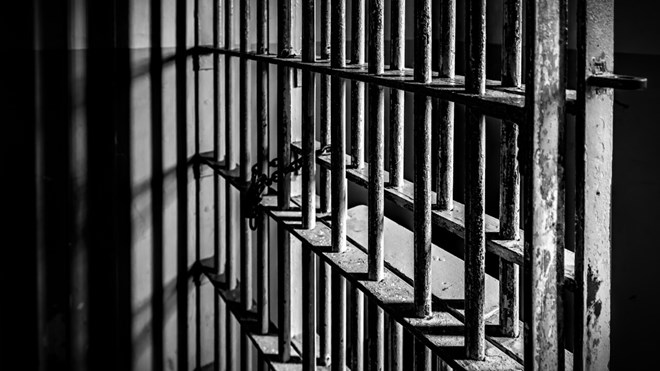
ALEXANDRIA, Va. — A Dutch woman charged seven years ago with raising money for the Somali terrorist group al-Shabab has been extradited to the U.S. to face trial.
Farhia Hassan, 38, made an initial appearance Friday in U.S. District Court in Alexandria after being brought to the U.S. on Thursday on charges of conspiring to provide material support to a terrorist organization. She was ordered held pending her next hearing.advertisements
Prosecutors say Hassan helped raise money by telling donors it would fund schools and orphans when it was actually going to terrorists. The indictment alleges that al-Shabab cells in Nairobi, Kenya, and Hargeisa, Somalia received payments over a period from 2011 through 2014.
She faces up to 15 years in prison if convicted.
While Hassan was in the Netherlands fighting extradition over the last seven years, her lawyers in the U.S. were working to get the charges against her tossed out. The defense lawyers argued that the U.S. lacked jurisdiction to charge a Dutch woman with giving money to a Somali terrorist group. And they said the long delays in bringing her to trial amounted to a denial of her speedy trial rights.
But Judge Anthony Trenga ruled last year that the case could move forward. He said that several of Hassan’s co-conspirators were based in the U.S., and that the U.S. has a legitimate interest in prosecuting supporters of a group designated as a terrorist organization.
He also ruled that Hassan’s own efforts to fight extradition were responsible for the trial delays. Hassan’s lawyer Jessica Carmichael declined comment after Friday’s hearing.
Two of Hassan’s co-defendants, Muna Osman Jama of Reston, Virginia, and Hinda Osman Dhirane of Kent, Washington, were convicted back in 2016 and received prison sentences of 12 and 11 years, respectively.
At trial, defense lawyers argued that the amounts contributed by the women were negligible, amounting to a few thousand dollars in total from a group of about 15 women. They also said the money was intended to care for injured al-Shabab soldiers and that providing funds for medicine in an armed conflict cannot be considered a criminal act under international treaties.
The defense also raised First Amendment issues, saying their advocacy for al-Shabab should not be fodder for a criminal conviction.
Reversing Sudan’s Coup
Reversing Sudan’s Coup
Source: The International Crisis Group (ICG) published on 26 October 2021 a statement titled “Reversing Sudan’s Dangerous Coup.”
The ICG urges that the African Union lead an effort to reverse a coup in Sudan that could tip the country into sustained unrest and chaos.
Labels: Abdalla Hamdok, Abdel Fattah al-Burhan, aid, AU, coup d’etat, debt, Ethiopia, EU, Forces for Freedom and Change, Gulf States, internet, Omar al-Bashir, sanctions, US
US, China, and Russia React Differently to Military Coup in Sudan
US, China, and Russia React Differently to Military Coup in Sudan
Source: Newsweek published on 25 October 2021 an article titled “How U.S., China and Russia Are Reacting to Latest Government Overthrow in Sudan” by Tom O’Connor.
The United States, China, and Russia reacted differently to the military coup in Sudan this week. The United States took the strongest and most negative position on the coup. China’s reaction was neutral while Russia was slightly sympathetic to the power grab.
Labels: China, coup d’etat, foreign policy, military, Russia, Sudan, US
Ethiopia’s Civil War
Ethiopia’s Civil War
Source: The International Crisis Group (ICG) published on 26 October 2021 a briefing titled “Ethiopia’s Civil War: Cutting a Deal to Stop the Bloodshed.”
The ICG predicts that Ethiopia’s civil war is likely to worsen. It urges outside powers to back the African Union’s new envoy’s efforts to move instead toward a ceasefire.
Labels: Afar Region, aid, AU, Benishangul-Gumuz Region, cease fire, Eritrea, Ethiopia, EU, humanitarian crisis, IDPs, OLF, Olusegun Obasanjo, Oromia, Oromo Liberation Army, Sudan, Tigray Region, TPLF, US
US to review support for elite Somali military unit
US to review support for elite Somali military unit


Source: VOA, Wednesday October 27, 2021
By Falastine Iman
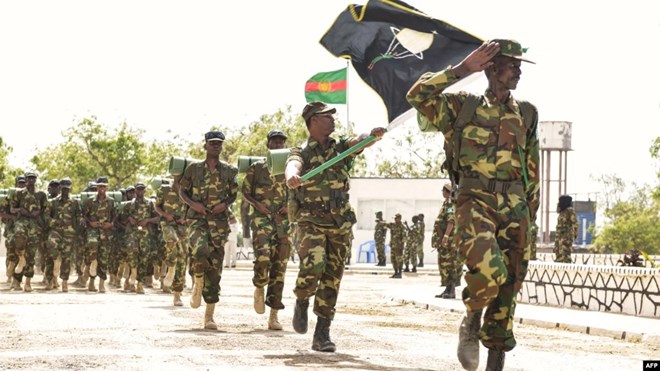
FILE – Somalian army special commando unit (Danab) marches during the 54th anniversary of the Somali National Army, held at the Army Headquarters in Mogadishu, April 12 2014.
The United States says it will review its support for an elite unit of the Somali National Army following its participation in a battle against a former ally in the fight against al-Shabab extremists.advertisementsAn official at the U.S. embassy in Mogadishu spoke to VOA’s Somali service following reports that U.S.-trained elite Somali forces known as Danab, or “lightning,” took part in this week’s fighting in the central Somali town of Guriel.
The fighting pits government troops and Galmudug regional forces against the militias of Ahlu Sunna Wal Jama’a (ASWJ). The moderate Islamist group is a rival to al-Shabab, which the United States considers the major militant threat in the region.
A Danab commander, Major Abdilatif Ahmed Ali Fayfle, was among those killed in the fighting.
The U.S. official in Mogadishu, speaking on condition of anonymity, said the embassy is aware of the reports that Danab forces were involved in the fighting and of the death of the Danab commander.
The official said the support would be reviewed as a result of that involvement.
“The United States provides training and support coordination to Somali National Army Danab Brigade units to advance our shared objective of defeating al-Shabab,” said the official. “As a result of this incident, we will be reviewing the support we provide to ensure it is being used appropriately and consistent with U.S. policy and objectives.”
VOA Somali tried unsuccessfully to contact the commander of Somali national forces, General Odawaa Yusuf Rageh, who was in the Guriel area this week.
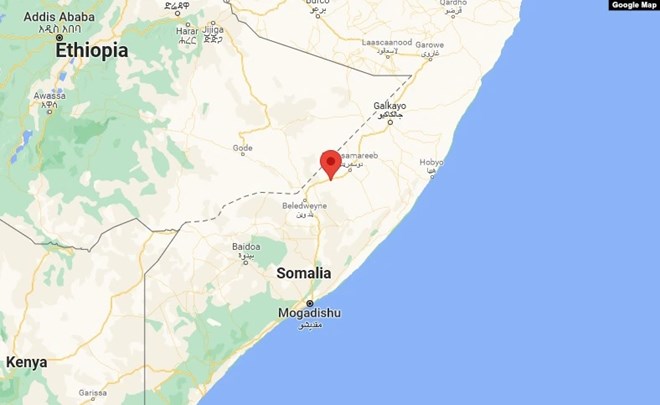
Guriel, Somalia
The fighting in Guriel, which started on Saturday, has claimed the lives of dozens of people, injured scores of others, and displaced about 100,000 Somalis, according to local officials and health workers.
ASWJ militias were ousted from the area in early 2020 following the formation of a new administration for Galmudug state. The group’s leaders fled the area at the time.
Earlier this month, the group suddenly remerged ahead of planned parliamentary elections, sparking the current armed conflict against the federal government and Galmudug forces.
The official said the U.S. extends condolences to the families and loved ones of all those affected.
“We call on all sides to cease military operations and engage in political dialogue towards peaceful resolution,” said the official.
The U.S. has been training and providing support to Danab since 2013. Danab, which is currently about 1,400 military personnel, has bases in southern and central Somalia. In addition to training the Danab soldiers, the U.S. has been carrying out airstrikes against al-Shabab militants in support of the Somali government.
BREAKING: ASWJ withdraw from Guriel, ending four days of intense battle
BREAKING: ASWJ withdraw from Guriel, ending four days of intense battle

Source: Hiiraan Online, Wednesday October 27, 2021
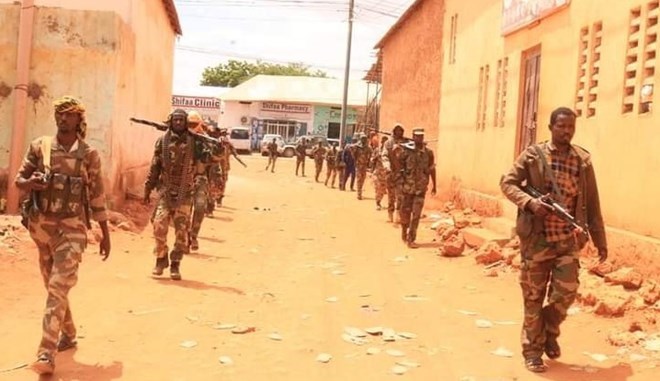
Government troops are now in control of Guriel.
Guriel (HOL) – Ahlu Sunna Waljama’a (ASWJ ) forces have left Guriel early Wednesday morning after four days of intense battle against government security troops that have left more than 120 people dead and another 100,000 displaced.
The withdrawal of Ahlu Sunna forces from Guriel district came after local businessmen and politicians facilitated talks to secure a safe passage for the group.advertisementsGalmudug and federal government forces managed to take control of Guriel on Saturday afternoon. They held onto the town despite an ASWJ offensive on Saturday evening and Sunday morning.
Fighters loyal to ASWJ retreated north to the nearby village of Godwiil. The group previously defied a government ultimatum to leave the town on Sunday.
Government troops now control the town and have secured the main roads and established checkpoints.
Fighting between ASWJ and Galmudug regional security forces – backed by Federal troops – began at dawn on Saturday morning. Government troops, who have been mobilizing on the outskirts of Guriel, attacked ASWJ fighters who overran Galmudug security forces nearly three weeks prior.
The fighting was intense and involved vehicle-mounted anti-aircraft guns, mortars and heavy artillery. Among the dead on the first day of battle was the regional commander of Somalia’s elite Danaab Brigade, a US-trained commando force. Residents say Ahlu Sunna mobilized local religious leaders and madrasa teachers to fight alongside them in the battle, which lasted the whole day.
According to the VOA, the US said it would review its support for the Danaab, which is outfitted by the US to fight against the militant insurgency group Al-Shabaab.
ASWJ, a Sufi paramilitary group, was previously a government ally in the region as they both collaborated to fight Al Shabaab. The group was ousted from Galmudug by Somali troops in early 2020 following the formation of the new Galmudug regional administration. The group re-emerged earlier this month, taking over Guriel and another nearby town.
The UN voiced its concerns on Wednesday about the humanitarian impact the conflict will have on the more than 100,000 people who have been displaced. Galmudug President Ahmed Abdi Kariye “Qoorqoor” defended his government’s decision to deploy a military offensive against the group, saying that all diplomatic options were exhausted.
UN hails direct elections in Puntland
UN hails direct elections in Puntland

Source: Hiiraan Online, Tuesday October 26, 2021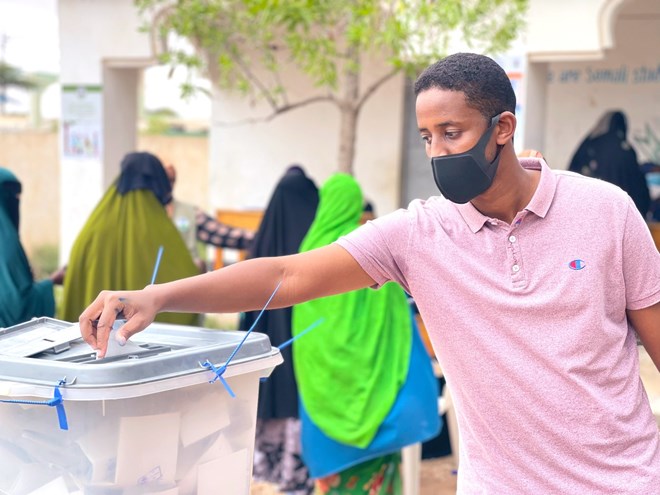
A voter in Qardho, Puntland
Puntland (HOL)- The United Nations (UN) praised Puntland for holding its first-ever ‘one person, one vote electoral process in three regional districts.
UN Representatives who visited Qardho said that they were pleased with how smooth the historical electoral process was.advertisements”The United Nations in Somalia believes that the successful completion of ‘one person, one vote’ elections in Qardho, Eyl and Ufeyn would be an important step in showing the feasibility of universal suffrage elections at local, state and national levels across the country.”
Puntland conducted the local elections in the districts of Qardho, Ufeyn and Eyl. It was the first time in Somalia -outside the breakaway region of Somaliland – that residents were able to elect their representatives directly in over 50 years.
Puntland President Said Abdullahi Deni said that the historic vote marked the beginning of the return to a government by popular rule.
“I have cast my vote in Gardho. Today is the beginning of returning power to the people to choose their political representatives and determine their future. This is a vital milestone for Puntland and Somalia, engaging citizens in Puntland on one person, one vote.”
The UN further commended the Transitional Puntland Electoral Commission (TPEC), the government and the people of Puntland for their commitment to holding direct elections, as enshrined in Puntland’s Constitution.
British Ambassador to Somalia, Kate Foster, made rounds within the three districts as the voting went on and praised the exercise.
“Exciting pictures as voting start across Puntland,” Foster tweeted.
Leaders who have been praising the move to have people elect their leaders for the first time were Foster.
Foster visited Garowe last month ahead of the planned local elections in October to see the progress of the democratization process in Puntland.
During the visit, the Ambassador held her first meeting with President Said Abdullahi Deni, where they spoke much on the election process and plans that the UK had for the region.
The elections were seen as a pilot exercise to test how the viability of state-wide elections expected to take place in 2022.
European task force established to locate ‘cruellest’ human trafficker
European task force established to locate ‘cruellest’ human trafficker
Source: Tuesday October 26, 2021
By Zecharias Zelalem
Libya-based fugitive Kidane Zekarias Habtemariam is sought by Europol after escaping prison in Ethiopia, where he was convicted of extortion, kidnapping, and torturing migrants to death
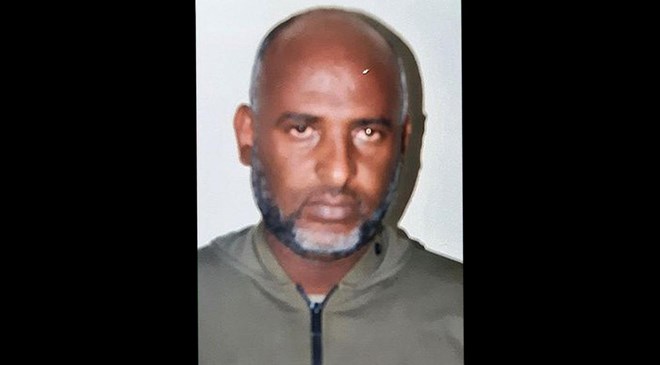
Kidane Zekarias Habtemariam escaped from prison in Ethiopia (Netherlands police)
The Dutch government and Europol have established an international task force to locate the whereabouts of notorious human trafficker Kidane Zekarias Habtemariam.
Convicted by an Ethiopian court of extortion, kidnapping, and torturing migrants to death in Libya, Kidane managed to escape Ethiopian custody in February, just prior to being sentenced to life in prison.advertisementsItaly will also form part of the European task force, Middle East Eye has learned, as the country is often the target destination of Kidane’s victims, migrants from the Horn of Africa who are sold into captivity in Libya.
The move comes as part of ramped-up initiatives by the Netherlands to hasten the recapture of the fugitive, who escaped after pretending to use the bathroom at a courthouse in the Ethiopian capital Addis Ababa, before simply walking off the premises and absconding.
Last week, the Netherlands listed Kidane – who it described as one of the “cruellest people smugglers” – among the country’s most wanted criminals.
A number of Kidane’s victims are said to reside in the Netherlands, including one who featured on a weekly Dutch law enforcement television program last week which profiled Kidane.
“For us, but most of all for victims of human trafficking of this criminal organization, it is important that Mr Kidane faces justice again,” Brechtje van de Moosdijk, spokeswoman for the Netherlands Public Prosecution Service, told MEE.
“Whether it is in Ethiopia or in the Netherlands, someone sentenced or wanted for such grave crimes cannot remain at large.”
Libyan hell
Listed as 37 but thought to be closer to 50, Kidane is believed to have made a fortune by taking advantage of Libya’s post-Ghaddafi lawlessness to establish himself as a crime boss there.
His extortion racket targeted migrants hopeful of sailing across the Mediterranean to European shores, kidnapping and holding them at a large warehouse staffed with armed Libyan guards in the town of Bani Walid, 180 km southeast of Tripoli.
Among migrants, Bani Walid became known as a “ghost town” due to the many migrants who would disappear without a trace after being taken there.
Survivors describe widespread rape, starvation, and brutal torture in the warehouse. The torture ends either when victims coerce their loved ones to wire over exorbitant ransom fees of up to $6,000 – or if they are unable to pay, they are murdered by their kidnappers.
“Kidane lived in a home adjacent to the camp. He’d come to see us and beat someone up when he felt like it,” one survivor, 24-year-old Ethiopian national Fuad Bedru, told MEE earlier this year. “The man is a savage, a monster.”
“I’ve seen every kind of atrocity. Kidane and his gang are bathed in blood. Killing is nothing for them.”
Victims in the Netherlands have described to Dutch police how Kidane would organise football matches between migrants at Bani Walid, where winners would be awarded a woman from the opposing team to rape, and players who miss scoring opportunities would be shot.
Kidane’s criminal enterprise might have made victims of tens of thousands since beginning operations in or around 2014, exploiting the desperation of Eritrean, Ethiopian, and Somali nationals eager to flee conflict, oppression, and poverty in their homelands.
Kidane synced his Libya operations with those of a close friend and fellow human trafficker, Tewolde Goitom, also an Eritrean national who was better known as “Walid.”
Earlier this year, Walid was jailed for 18 years in Ethiopia and is accused of raping hundreds of captive women in Libya.
According to Sweden-based migrant rights activist and journalist Meron Estifanos, Kidane delivered a 10m birr (over $211,000) bribe to an Ethiopian official, who facilitated his escape.
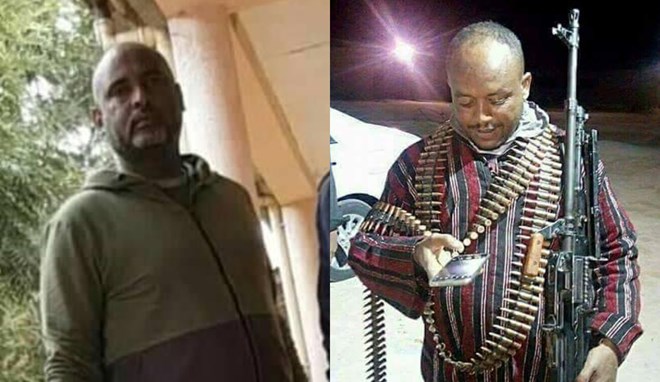
Few photographs are available of human trafficker Kidane Zekarias Habtemariam, left, and his associate Tewolde Goitom (Handout)
“The [bribed official] secured Kidane’s transportation out of Ethiopia and he was in Kenya for a while,” Meron told MEE.
Victims criticised Ethiopian authorities for permitting one of the continent’s most dangerous criminals to escape and began openly wondering if his partner Walid would slip away as well.
Nevertheless, according to the Dutch public prosecution, Ethiopian counterparts remain involved in the hunt for Kidane.
“We have established [judicial] contacts with other countries, including Ethiopia, as this is the last country Kidane was known to reside in,” van de Moosdijk said. “We’d welcome it if countries all over the world paid attention to such criminal activities, under which thousands of victims are being smuggled and exploited in degrading conditions.”
Responsibility
At least one prominent migrant rights advocate has dismissed the notion that the initiative suggests a greater European interest in protecting the rights of migrants in Libya.
“Kidane or other smugglers wouldn’t have been there in the first place, had Europe not closed all legal access [for migration], creating the conditions for the proliferation of human trafficking,” said Father Mussie Zerai, head of the Rome-based Habeshia organisation, which lobbies for migrant rights.
Of Eritrean descent himself, Father Mussie has worked on migration-related issues for decades, providing assistance to people trying to cross the Mediterranean, including coordinating rescues with the Italian coastguard for shipwreck victims and lobbying on behalf of migrants languishing in Libyan detention centers.
Nominated for the Nobel Peace Prize in 2015, his phone number is often circulated amongst migrants in Libya as a sort of distress hotline.
“Europe maintains a mandate and a policy of restriction which leads to human rights violations in Libya,” he told MEE. “Europe presses on the Libyan government and pays it to stop refugees trying to reach its shores, but doesn’t care about the consequences.”
Father Mussie was referring to the EU’s support for various Libyan security institutions, including the country’s coast guard, which is infamous for the abuses it has meted out against migrants.
Human Rights Watch has called on the EU to review its cooperation with Libya.
Earlier this month, Libyan authorities launched a massive crackdown, detaining over 5,000 migrants, including hundreds of children, and holding them in overcrowded facilities. The crackdown has been condemned by Eritreans across Europe and North America, with demonstrations calling for humane treatment of migrants.
Still, the renewed measures to recapture the human trafficking kingpin are welcomed by some victims, who say it at least keeps Kidane on the radar.
Kiflezghi, 33, remembers vividly the four-month period in 2017 in which he says his younger brother was whipped almost daily at the Bani Walid warehouse until relatives in Europe cobbled together over $10,000 to buy his freedom.
“He is the devil incarnate,” he said over the phone from his residence in Germany. “Our family is still scarred by the stress and anguish we suffered during that horrible year.”
“It’s good to hear that people are after him, although I don’t know if it will be effective,” Kiflezghi added. “He has money, influence, and contacts across Africa who protect him. It is what got him out of an Ethiopian jail.”
UN chief condemns ‘ongoing military coup’ in Sudan
UN chief condemns ‘ongoing military coup’ in Sudan

Source: UN Sudan/Ayman SulimanProtesters take to streets in the Sudanese capital, Khartoum. (11 April 2019) 25 October 2021Peace and Security
UN Secretary-General, António Guterres on Monday condemned the “ongoing military coup” in Sudan, saying Prime Minister Abdalla Hamdok and all other officials, “must be released immediately.” In a statement, he called for the “immediate reconstitution” of the Government, which is due to guide Sudan through to democratic elections.
Long-time ruler Omar al-Bashir was overthrown by the military following months of popular protest in April 2019, and a transitional government was set up comprising both military and civilian leadership, after a power-sharing agreement, that was due to lead to full democratic elections in 2023.
Now, according to news agencies, Sudan’s military has dissolved civilian rule, arrested political leaders and declared a state of emergency. Protesters have reportedly taken to the streets of the capital, Khartoum, and there are reports of gunfire.
In a statement posted on Twitter, the Secretary-General said that “there must be full respect for the constitutional charter to protect the hard-won political transition.” https://platform.twitter.com/embed/Tweet.html?creatorScreenName=UN_News_Centre&dnt=false&embedId=twitter-widget-0&features=eyJ0ZndfZXhwZXJpbWVudHNfY29va2llX2V4cGlyYXRpb24iOnsiYnVja2V0IjoxMjA5NjAwLCJ2ZXJzaW9uIjpudWxsfSwidGZ3X2hvcml6b25fdHdlZXRfZW1iZWRfOTU1NSI6eyJidWNrZXQiOiJodGUiLCJ2ZXJzaW9uIjpudWxsfSwidGZ3X3NwYWNlX2NhcmQiOnsiYnVja2V0Ijoib2ZmIiwidmVyc2lvbiI6bnVsbH19&frame=false&hideCard=false&hideThread=false&id=1452636336398213125&lang=en&origin=https%3A%2F%2Fnews.un.org%2Fen%2Fstory%2F2021%2F10%2F1103902&sessionId=3135feec6ad447d1c5d4d9da8338b535f25bc1df&siteScreenName=UN_News_Centre&theme=light&widgetsVersion=f001879%3A1634581029404&width=550px
In a full statement issued later in the day, through his Spokesperson, Mr. Guterres said that “Sudanese stakeholders must immediately return to dialogue, and engage in good faith to restore the constitutional order and Sudan’s transitional process.
“The United Nations reiterates its unwavering commitment and support to the realization of Sudan’s political transition. Any attempts to undermine this transition process puts at risk Sudan’s security, stability and development.
He added that the UN “will continue to stand with the people of Sudan as they strive to fulfil their aspirations for a peaceful, prosperous and democratic future.”
Progress in jeopardy
The UN High Commissioner for Human Rights also condemned the attempted coup.
“These actions threaten the Juba Peace Agreement and jeopardize the important progress made towards democracy and respect for human rights”, Michelle Bachelet said.
She called on military authorities to abide by the constitutional order and international law, withdraw from the streets, and resolve any differences with civilian leaders serving on the Transitional Council through dialogue and negotiation.
“I utterly deplore the reported arrest of the Prime Minister, several Ministers, leaders of the Forces of the Freedom and Change and other civil society representatives, and call for their immediate release”, she continued.
Communication systems down
Ms. Bachelet also pointed out reports that the internet is down in the country and other means of communication are suspended.
“Blanket internet shutdowns contravene international law, and Internet and mobile services must be restored, as they are essential for people to seek and receive information, particularly in these unsettling circumstances”, she explained.
She asked military and security forces to refrain from unnecessary and disproportionate use of force, to respect people’s freedom of expression, as well as the right of peaceful assembly.
According to her, “it would be disastrous if Sudan goes backwards after finally bringing an end to decades of repressive dictatorship.”
“The country needs to move forward to consolidate democracy, a wish expressed countless times by the Sudanese people, including loudly and clearly on the streets last week and today”, she added.
UN Mission
The head of the UN Integrated Transition Assistance Mission Sudan (UNITAMS), also released a statement, declaring that the arrests of the Prime Minister, government officials and other politicians are “unacceptable.”
“I call on the security forces to immediately release those who have been unlawfully detained or placed under house arrest”, Volker Perthes said. “It is the responsibility of these forces to ensure the security and wellbeing of people in their custody.”
The UNITAMS chief, who acts as a Special Representative of the Secretary-General, also urged everyone involved to exercise the utmost restraint.
“All parties must immediately return to dialogue and engage in good faith to restore the constitutional order”, Mr. Perthes concluded
US Threatens to Cut Aid to Sudan
US Threatens to Cut Aid to Sudan
Source: Axios published on 25 October 2021 an article titled “U.S. Threatens to Cut Aid to Sudan after Military Takeover” by Barak Ravid.
The Biden administration threatened to cut U.S. aid to Sudan if the military continues with its military coup. Any changes to the transitional military/civilian government puts at risk U.S. assistance.
Labels: Abdalla Hamdok, Abdel Fattah al-Burhan, aid, Biden administration, coup d’etat, internet, Jeffrey Feltman, Sudan, US
The U.S. Should Recognize Somaliland
The U.S. Should Recognize Somaliland
October 19, 2021 29 min read Download Report

Source: Joshua MeserveySenior Policy Analyst, Africa and the Middle EastJoshua Meservey is the Senior Policy Analyst for Africa and the Middle East at the Heritage Foundation.
SUMMARYThe U.S. should recognize Somaliland as an independent country. In practice, the territory is not now, nor is likely to be, a part of Somalia. Acknowledging that reality would allow Washington to create more effective policy in an important and contested region. A strong relationship with an independent Somaliland would hedge against the U.S. position further deteriorating in Djibouti, which is increasingly under Chinese sway. It would demonstrate the benefits Washington confers on those who embrace representative government and would allow the U.S. to better support the territory’s tenacious, but still-consolidating, democracy. An independent Somaliland would be a stable partner that has little risk of experiencing the tumult that frustrates American interests elsewhere in the volatile region. Somalilanders deserve the justice of having their decades-long practice of independence recognized and should be allowed to disassociate from the dysfunction of southern Somalia that hinders their development.
KEY TAKEAWAYS
Somaliland has been de facto independent for 30 years. The U.S. should recognize this and build a facts-based policy that better serves its strategic interests.
Recognizing Somaliland’s independence would enable the U.S. to hedge against further deterioration of its position in Djibouti, which is under Chinese sway.
This would reward Somaliland for its sincere commitment to democracy and deliver the justice of honoring its strong and consistent aspirations for independence.
Is Sudan’s Democratic Transition Over?
Monday, October 25, 2021
Is Sudan’s Democratic Transition Over?
Source: The Middle East Institute published on 25 October 2021 my brief commentary titled “Protests in Sudan End in Apparent Coup.”
This explains the background leading up to the apparent military coup d’etat in Sudan on 25 October, which seems likely to end the transition to a democratic civilian government.
Labels: Abdalla Hamdok, coup d’etat, democracy, Ethiopia, Forces for Freedom and Change, Rapid Support Forces, Sudan, US
China’s Supply Chain Problems Impact Africa
How We Made It in Africa published on 21 October 2021 an article titled “How China’s Supply Chain Crunch Is Impacting African Businesses” by Philip Myburgh.
Chinese supply chain problems are having a significant impact on Africa, which relies heavily on imports from China. This may encourage more intra-Africa trade.
Labels: Africa, China, COVID-19, supply chain, trade
Ethiopia: UN forced to abort humanitarian aid flight into Tigray
Ethiopia: UN forced to abort humanitarian aid flight into Tigray
Source: UN, 23 October 2021Humanitarian Aid
A UN humanitarian aid flight destined for the capital of the Tigray region in northern Ethiopia, was forced to return to Addis Ababa due to airstrikes on Friday, raising “serious concerns” for the safety of staff working on the ground, said the UN’s Emergency Relief Coordinator, in a statement.
Erdogan pledges to double bilateral trade at Turkey-Africa summit
Erdogan pledges to double bilateral trade at Turkey-Africa summit
The Turkey-Africa Economic and Business Forum held in Istanbul from 21-22 October, aims to provide a platform for Turkish businesses to gain a foothold on the continent.
Source: Shoshana Kedem October 19th 2021AfricaTrade & Investment
Turkey aims to double its bilateral trade volume with Africa from $25bn to $50bn, said Turkish President Recep Tayyip Erdogan at the Turkey-Africa Economic and Business Forum on Friday 22 October.
The Forum, held in Istanbul from 21-22 October, was attended by some 3,000 businessmen and women from Turkey and across Africa, 30 African ministers and representatives of regional organisations.
Organised by Turkey’s Foreign Economic Relations Board (DEIK) in cooperation with the Trade Ministry and the African Union Commission (AUC), the Forum took place under the slogan “Deepening Turkey-Africa Partnership: Trade, Investment, Technology and Logistics.”
Speaking on the first day of the Forum, Turkey’s trade minister, Mehmet Muş, recalled that the country’s trade volume with Africa had risen to its present $25bn level from just $5.4bn in 2003. He said that Turkey’s aim in the region was to establish relations based on mutual respect and a win-win strategy.
The first day saw Turkish and African ministers of trade, investment, technology and logistics hold closed door meetings on deepening the Turkey-Africa partnership.
The agenda for day one also scheduled bilateral meetings with business leaders and ministers, as well as panel discussions on emerging opportunities in agriculture, healthcare and the new regional free-trade zone – the African Continental Free Trade Area (AfCFTA).
The second day saw hosted sessions promoting innovation, Turkish-African banking cooperation, trade finance and women’s leadership.
“Raising the Turkish-African trade volume to $50bn must be our main goal,” the chairman of DEIK, Nail Olpak, said in his address on the second day of the Forum. “Signing free trade agreements, agreements to reciprocally strengthen and protect investments, besides cooperation and knowledge-sharing in the fields of industrialisation, agriculture, construction, textiles and health, are our priorities.”
Erdogan’s Africa tour
Ahead of the Forum, Erdogan undertook a tour of three African countries in four days, meeting leaders and investors in Angola, Nigeria and Togo.
During his visit to Angola, the Turkish president said there were significant bilateral opportunities in the energy and defence sectors, with seven deals signed so far between the two countries. He also attempted to differentiate Turkey’s offering to Africa from the West.
“There are still those who cannot accept the independence, freedom and equality gains of the African peoples. We have been witnessing the recurrence of this indigestion recently,” he said in a speech to the country’s parliament.
“As Turkey, we reject Western-centred Orientalist approaches to the African continent. We embrace the peoples of the African continent without discrimination.”
The second country on his tour was Togo, where Turkey recently opened its 43rd embassy in Africa (see below). Erdogan was greeted by President Faure Gnassingbé, who hosted a working dinner at which they were joined by President Roch Kaboré of Burkina Faso and President George Weah of Liberia.
His final stop was Nigeria, where he signed eight bilateral agreements with President Muhammadu Buhari. Nigeria is already Turkey’s biggest trade partner in sub-Saharan Africa, but the Nigerian president expressed the wish that the volume of trade would soon increase from $2bn to $5bn.
Battle for hearts and minds
Since 2009, Ankara has engaged with African countries, big and small, at feverish speed, with Erdogan’s overriding ambition on the continent driven by trade and investment, says Tim Ash, an emerging markets economist at BlueBay Asset Management.
“For quite a long time Turkey has been very Africa focused. Under Erdogan, Turkey embassies have expanded massively globally as part of their effort to boost trade and investment,” Ash says.
That building spree has taken the number of Turkish embassies in Africa from a dozen in 2009 to 43 today. This year, it will open its 44th, in Guinea-Bissau.

Erdogan’s foreign policy is also moulded by efforts to counter the growing influence of rival Islamic powers in Africa such as the UAE and Egypt.
With strong historical trading links, the UAE has become an increasingly vital partner for the continent, and its second-largest investing country, second only to China, according to the Financial Times’ fDI Intelligence.
Ankara’s allegiance with Qatar has pitted Turkey against Saudi Arabia, Egypt and the UAE in a “battle for hearts and minds” on the continent, Ash says.
Saudi Arabia, Egypt and the UAE are fiercely opposed to the Muslim Brotherhood and its associated brand of political Islam, Ash says. Doha and Ankara have provided support for the Muslim Brotherhood in Egypt and backed rebels fighting to overthrow Syrian President Bashar al-Assad.
This has manifested itself in Turkey’s sweeping investments in education projects on the continent, building 17 schools in Nigeria alone.
“Turkey’s been a big investor in education. Expanding Turkish cultural-religious influence as a conduit to boosting Turkish trade,” Ash says.
Africa also represents a huge success story for Erdogan as Turkey’s tourist economy weathers a battering from Covid-19, Ash says.
“Erdogan has massive problems at home, the economy’s not doing well and and Africa has been one of that has been relatively successful for him in terms of business and trade. So he probably wants some nice photo shoots of him shaking hands and doing stuff in Africa.
As Turkey’s relations with Europe unravel, Ankara has been keen to diversify its trade away from Europe. Two-thirds of Turkey’s trade investment financing comes from Europe, but amid political tensions Erdogan has tried to kindle trade ties elsewhere, starting with the Middle East. Souring relations with Saudi Arabia, the UAE and Egypt, and a deteriorating regional security situation refocussed the president’s sights on the continent.
“Africa has been a relatively low hanging fruit, with less geopolitical problems. So Africa is part of this diversification ploy,” Ash adds.
“Africa has been very beneficial for Turkish companies, manufactured products, food, its been a big market, they’ve also been a conduit of transit trade and travellers from Africa.”
Today, Turkish fingerprints are all over Africa, from the Kigali Arena in Rwanda, east Africa’s biggest stadium, built by a Turkish construction firm, to an Olympic swimming pool in Senegal, a colossal mosque in Djibouti and Turkish military hardware on Libya’s battlefields. But while most African countries have welcomed the new partnership, experts wonder about the long-term ambitions behind Erdogan’s Africa strategy.
Additional reporting by Charlie Mitchell.
Huge Pro-democracy Protests in Sudan
Huge Pro-democracy Protests in Sudan
Source: Reuters published on 22 October 2021 an article titled “Mass Protests Held in Sudan against Prospect of Military Rule” by Khalid Abdelaziz.
Huge crowds marched in Sudan’s capital and several other cities on 21 October in demonstrations against the prospect of military rule. Reuters journalists estimated that hundreds of thousands of protestors turned out. The US embassy in Khartoum issued a statement expressing strong support for Sudan’s democratic transition to civilian government.
Labels: Abdalla Hamdok, Abdel Fattah al-Burhan, democracy, Forces for Freedom and Change, Omar al-Bashir, Sudan, US
Somalis in UK targeted with death threats and abuse after David Amess killing
Somalis in UK targeted with death threats and abuse after David Amess killing

Source: The Guardian, 24 October 2021
Sunday October 24, 2021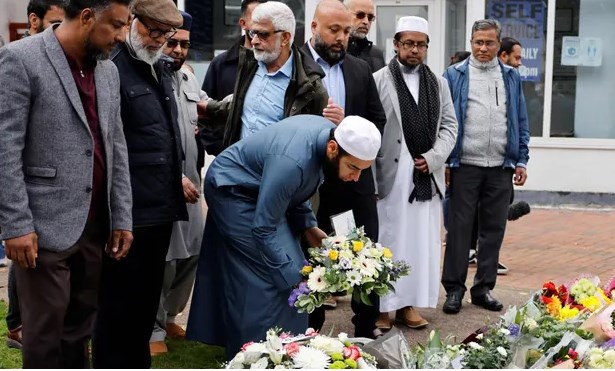
Deep in the sprawling Andover estate in Finsbury Park, north London, talk turns to an identity crisis holding back teenage and twentysomething British Somalis.
Born in London, 23-year-old Najma Sharif laments how some view her as not British enough, as others in her community believe she is not sufficiently Somalian. In her parents’ birthplace she is dismissed as diaspora; at home a mere ’Mali.
Speaking as darkness fell on Friday – just a day after Ali Harbi Ali, a 25-year-old, British-born man of Somali heritage, was charged with the murder of the Conservative MP Sir David Amess in Essex – Sharif said the intersectionality of being black and Muslim was hitting young men particularly hard.
The fear is that the killing of Amess has compounded negativity towards Britain’s Somali community; an anecdotal rise in hate crime has already been recorded.
Almost immediately after the MP’s killing, death threats were reported, according to Kahiye Alim, director of the Council of Somali Organisations. The morning after, advice was issued to Somali groups and businesses to get in touch with their local police and crime commissioners, and their council, for possible help.
“We’ve had death threats against members, people telling them: ‘Go home, terrorist’, abuse on social media,” said Alim.
Younger members of the community have been specifically targeted, and a couple of youth clubs were forced to shut.
Already, Alim’s organisation has approached the mayor of London’s office for policing and crime for help reporting hate crime more effectively. This week he is hoping for a meeting with the Metropolitan police’s hate crime unit.
advertisementsAfter Ali was charged on Thursday, the Council of Somali Organisations produced a video on how the community can report hate crime; it is also offering tips on “personal safety”.
Sitting in the office of the charity Minority Matters, in the heart of the Andover estate, Sharif said there had been no reprisals during the past week.
Yet on the streets around the labyrinthine 1970s housing estate, she describes how police frequently target her brothers and friends.
“Some are even stopped in their school uniform or on their way to medical college. They are facing such negative stereotyping, suffering isolation and alienation from many sides,” she said.
Away from the Andover estate, the ethnicity of murder suspect Ali has shone a spotlight on Britain’s Somali community, which, although sizeable, remains largely overlooked, according to its representatives.
Alim anticipates the imminent results of the 2021 census will put Britain’s Somali community at 500,000.
For such a significant size, it has, he said, conspicuously little political clout.
Some councils still do not categorise Somali as a separate identity, despite Somalis first arriving in the UK during the mid-19th century, he added.
Recently his organisation felt the identity crisis had become so acute that it released a video guide on how to self-identify as Somali.
Sadia Ali, co-founder of Minority Matters, also points to the lack of an umbrella organisation championing the community’s needs.
“We are forgotten. We exist but at the same time we do not exist. There is a real crisis, we don’t belong in Somalia but we also don’t belong here,” said Ali.
Rakhia Ismail, former mayor of Islington in north London and now a Tory councillor, believes the Somali community’s lack of political heft is thwarting its hopes of improving outcomes for its young people.
She blames the Labour party, of which she was once a member, for treating the Somali electorate with “complacency”, accusing it of taking Somali support for granted.
Sharif said that while British Somali young men are too easily criminalised and targeted by police, their female peers are also viewed through the prism of inaccurate stereotypes.
“There are a lot of assumptions about black women – loud, obnoxious, aggressive – so when people talk to me, they are surprised. And as a Muslim they may think I’m oppressed – I’m not – or that I know all about FGM [female genital mutilation]. But I had no idea of it when growing up.”
Challenging stereotypes runs alongside campaigns for rehabilitation programmes for young men caught selling drugs. Too many, Sharif said, are written off after being caught dealing small amounts.
“They go to jail and come out with a criminal record and no opportunities,” she said.
Compounding the issue is that the model of university and career is failing many. “Some struggle to get a part-time job in a shop,” added Sharif.
Sadia Ali estimates that out of every 100 young British Somali men, between five and 10 end up with successful careers in white-collar sectors, such as the legal profession.
A bleak outlook is nothing new for Britain’s Somalis. Many of their parents have struggled to secure an enviable job. More than a third of Somali-born men with children born in the UK are economically inactive or unemployed. Of those working, Alim said that a “very large proportion” work in the gig economy or navigate life on zero-hours contracts.
Gesturing to the towering Andover flats surrounding her charity, Ali said: “We have to protect young people. We are losing a generation who were born and bred here. Then there is the question: ‘How do we make our young people safe?’”
At Least 20 Killed as Somalia Troops Battle Moderate Islamist Militia
At Least 20 Killed as Somalia Troops Battle Moderate Islamist Militia

Source: VOA, Sunday October 24, 2021
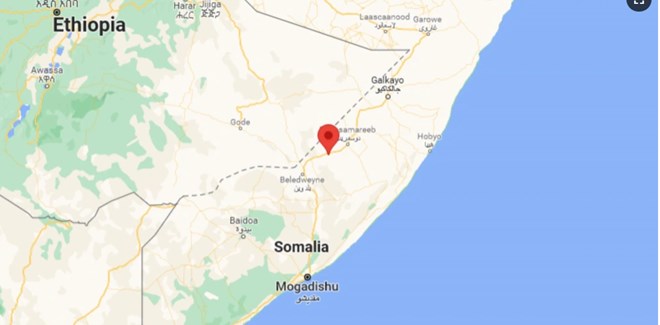
At least 20 people were killed and more than 40 wounded on Saturday when a moderate Islamist group clashed with Somali government troops over control of a town in central Somalia, according to witnesses and regional officials.
The clashes started at dawn Saturday morning when government troops, who have been amassing on the outskirts of Guri-El, a central Somali town some 400 kilometers north of the capital, Mogadishu, attacked bases held by Ahlu Sunna Wal Jama’a (ASWJ) rebels.
advertisements
According to residents, both sides used heavy artillery, mortars, machineguns, and vehicle-mounted anti-aircraft guns during a fierce battle in the streets.
Speaking on condition of anonymity, military officials from the opposing sides told VOA that both sides suffered fatalities.
A senior official with the Somali National Security Agency, Col: Abdirisaq Mohamud Yusuf, told VOA that the regional commander of Somali’s Danab Brigade, Abdiladif Feyfle, was among the dead.
Danab or “lightning” brigadiers are U.S.-trained Somali commandos.
“I can confirm that three of our soldiers were killed and more than 10 injured during the fighting,” Ahmed Shire Falagle, Galmudug’s regional state information minister, told VOA’s Somali Service. “I also know that a significant number of Ahlu Sunna Wal Jama’a militia were killed, although I cannot give exact number.”
Falagle also said government troops ultimately took control of the town and that opposing combatants retreated.
“We have driven the militia out of the town and now they are firing back from the outskirts,” he said.
But witnesses who asked not to be named for fear of reprisal said that government forces managed to hold control of only the police station, the district headquarters and several ASWJ administrative buildings.
“None of the two sides is in full control [of the town] yet,” one witness told VOA. “We can hear heavy gunfire and shelling. The government soldiers are positioned at strategic bases at the heart of the town.”
VOA phone calls to several ASWJ officials went unanswered.
A moderate Sufi sect, ASWJ previously assisted Somali government troops battling al-Shabab Islamist extremists, temporarily striking a regional power-sharing deal with the Somali government. Saturday’s fighting followed a simmering dispute over ASWJ’s representation in local, state and national government.
Mogadishu has been denying the group’s request to have power as an Islamic entity, saying its members should peacefully seek power through their respective clans. It also wanted the group’s militia to be integrated into national forces.
In February of last year, Somali troops seized towns previously under ASWJ control, including Guri-El.
Earlier this month, the Islamist group took control of Guri-El unopposed after forcing Somali government troops to withdraw.
In an interview with VOA Somali at the time, the group’s chief, Sheikh Shakir, said it wants to take control of towns and regions to better protect them from al-Shabab extremists.
Since then, tension has been building as government troops began amassing military reinforcement near the town.
The U.N. said on Thursday over 100,000 people had been displaced in Guri-El because of the military buildup.
Efforts to mediate differences by local elders and regional leaders failed, leading to Saturday’s bloody battle.
The fighting comes two days after Somalia’s president and prime minister said they had struck a deal to speed up the country’s long-delayed election process and to end a simmering feud that threatened to plunge the Horn of Africa nation into a fresh crisis.
The two men had been deadlocked over top security appointments and dismissals that were triggered by the mysterious disappearance of a female Somali spy who has long been declared dead by the country’s National Intelligence and Security Agency.
Experts warn that continued political instability and renewed fighting with the moderate Islamist group could benefit al-Shabab.
President, PM reach truce after weeks of tension
President, PM reach truce after weeks of tension

Source: Hiiraan Online, Friday October 22, 2021
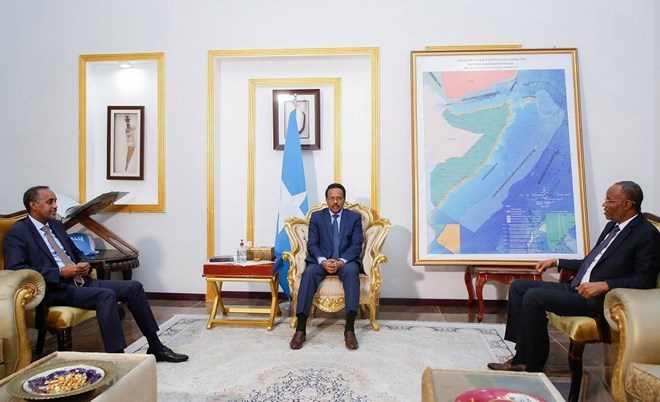
Mogadishu (HOL) – Somalia’s Prime Minister and President have agreed to end their longstanding political standoff on Thursday.advertisements
Government spokesperson, Mohamed Ibrahim Moalimuu, confirmed that the two leaders agreed on several points during a face-to-face meeting on Wednesday night that went into the early hours of Thursday. It was the first time Farmajo and Roble met since the constitutional crisis was sparked nearly two months ago.
The talks focused on who will lead Somalia’s embattled spy agency, how Ikran Tahlil’s case will be handled, and the timeline for upcoming federal elections.
As part of the agreement, both Farmajo and Roble will accept each other’s nominations to the security sector.
Roble agreed to allow Yasin Abdullahi Mohamud (Farey) to continue in his role as acting head of the National Intelligence and Security Agency (NISA). The PM’s pick for interim spy chief, General Bashir Mohamed Jama (Goobe), was appointed as the Minister of State.
In exchange, Farmajo would recognize Abdullahi Mohamed Nur as the Minister of Internal Security.
Farmajo and Roble have agreed to allow Ikran Tahlil’s case to run its course through the military court. Ikran’s murder and the subsequent alleged cover-up by NISA sparked a political standoff that shook the state. Ikran’s case led to the ouster of Farmajo’s confidante and close ally, Fahad Yasin, as Somalia’s intelligence chief.
In a statement released by Somalia’s state news agency, the two leaders apologized to the Somali people for the worry their public power struggle caused and vowed to work together to organize elections.
The meetings were mediated by the President of South West State, Abdiaziz Lafta-Gareen. Galmudug President Ahmed Kahiye undertook a similar endeavour last month at the behest of Laftagareen to no avail.
Somalia’s international partners have urged Roble and Farmajo to settle their differences amicably and work towards holding indirect elections.
US Cautions Citizens Against Travelling to Kenya
US Cautions Citizens Against Travelling to Kenya




Source: Kenyans.com.ke, Friday October 22, 2021
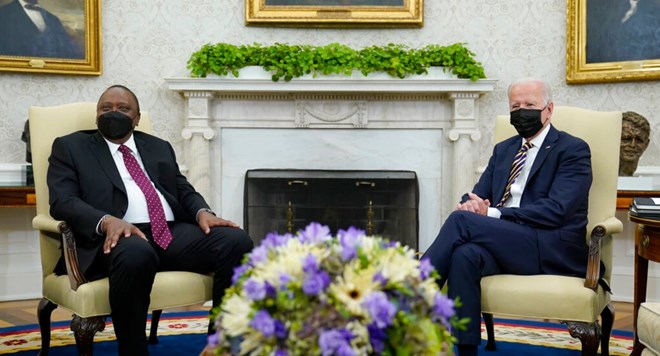
The United States of America has issued a travel advisory to its citizens travelling to Kenya and those currently living in the country.
Through a statement released on Thursday, October 21, the US Embassy in Nairobi cautioned its citizens against travelling to the Kenya-Somalia border and some coastal areas prone to terrorism.
It also warned them against travelling to areas within Turkana due to the high crime rate witnessed in the county.
The Embassy further red zoned Eastleigh and Kibera slums, underlining that they are unsafe to their citizens who are likely to be mugged or kidnapped.
“These areas are characterised by armed carjacking, mugging, home invasion, and kidnapping. Be especially careful when traveling after dark anywhere in Kenya due to crime,” their statement read in part.
They added “Local police are willing but often lack the capability to respond effectively to serious criminal incidents and terrorist attacks. Emergency medical and fire service is also limited.”
The US cited cases of terror attacks targeting both locals and foreigners as among the reasons for the travel advisory.
“Terrorist attacks have occurred with little or no warning, targeting Kenyan and foreign government facilities, tourist locations, transportation hubs, hotels, resorts, markets/shopping malls, and places of worship.
“These terrorist acts included armed assaults, suicide operations, bomb/grenade attacks, and kidnappings.”
While travelling to Somalia or areas near the border, residents were urged to seek assistance and protection.
“Some schools and other facilities acting as cultural rehabilitation centres are operating in Kenya with inadequate or nonexistent licensing and oversight. Reports of minors and young adults being held in these facilities against their wills and physically abused are common.”
Kenya-Somalia Ties after UN Court Decision
Kenya-Somalia Ties after UN Court Decision
Source: The International Crisis Group (ICG) published on 15 October 2021 an analysis titled “UN Court Decision a Fresh Test for Kenya-Somalia Ties” by Meron Elias.
An ICG expert discusses the potential impact on Kenya-Somalia relations of the recent International Court of Justice decision that upheld Somalia’s claims of a long-running maritime border dispute between the two countries.
Labels: al-Shabaab, AMISOM, foreign affairs, ICJ, international law, Kenya, maritime boundary, Mohamed Abdullahi Farmajo, Somalia, Uhuru Kenyatta

